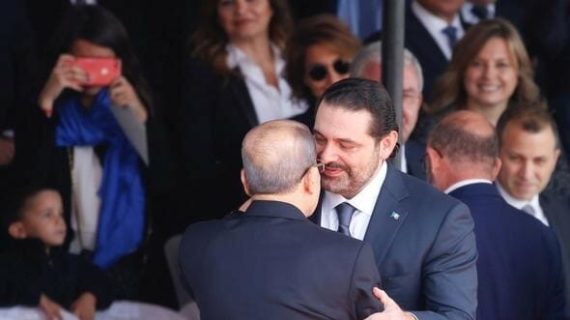After he announced his resignation in Riyadh on November 4, Saad Hariri met with King Selman bin Abdulaziz of Saudi Arabia, and later visited the United Arab Emirates and France. Hariri met with President Abdel Fattah el-Sissi in Egypt’s capital city Cairo yesterday, then finally went to Cyprus.
Hariri came back to his country yesterday, 17 days after his resignation.
Not a year had passed since Hariri’s government got a vote of confidence from the parliament when he made his resignation speech in which he blamed Iran’s “meddling” in the country and its powerful Lebanese ally, the Hezbollah movement for his decision, adding that he feared an assassination attempt.
“We are living in a climate similar to the atmosphere that prevailed before the assassination of Rafik al-Hariri,” referring to the assassination of his father, a former Lebanese prime minister.
The sudden move plunged Lebanon – a country with fragile political stability – into an ongoing period of uncertainty, fueling fears of a potential war between Saudi Arabia and Iran with Lebanon on the front line.
“We are worried about Hariri’s current conditions, he must return to Lebanon and explain the reasons for his resignation. His resignation is invalid unless he does so,” President Michel Aoun stated.
Officials in Lebanon had alleged that Hariri was forced to resign and was held hostage by Saudi authorities, an allegation Hariri denied in his first public statement following his resignation speech.
Lebanese officials said they would only accept his resignation if it was announced in Lebanon. Hariri’s resignation was also refused by his political rival Hezbollah.
Hezbollah leader Hassan Nasrallah accused Saudi Arabia of forcing Hariri to resign and holding him as a hostage.
Hezbollah members are also included in the Lebanese unity government that Hariri formed a year ago.
What changed in Lebanon?
Recommended
However, Hariri suspended his decision to resign as prime minister on Wednesday after holding a private meeting with Aoun in the Lebanese capital, Beirut.
“Today I presented my resignation to the president and he urged me to hold onto it for more dialogue about its reasons and its political underpinnings… and I accepted,” he said during a televised speech at the country’s presidential palace.
“I will do so in hopes that it will renew talks to strengthen our unity and resolve internal conflicts we have and how they reflect in our relations with our Arab brothers,” Hariri added.
“At this time, Lebanon needs exceptional efforts from everyone in the face of upcoming challenges… I look forward today to a real partnership with all of the political parties to put Lebanon’s interest on top of anything else.”
He emphasized the need of commitment from parties to keep Lebanon out of regional conflicts, referring to Iran-backed Hezbollah whose regional role is a source of deep concern for Saudi Arabia.
According to Zeina Khodr from Al Jazeera, Hariri’s tone has shifted since he gave his resignation speech.
“He [Hariri] didn’t even mention Hezbollah or Iran… He even said that he’s looking forward to a partnership with all political parties in the country.” Khodr said adding that she believes that intensive discussions behind closed doors occurred.
“The resignation was an attempt by Saudi Arabia to curb Hezbollah’s influence… That attempt backfired… Hariri was conciliatory in his message.”
In the international arena there have been calls for stability in Lebanon. The US warned regional powers against using the country for proxy conflicts. The UN has also called for stability in Lebanon.
*Written by Suna Nur Sarihan.





